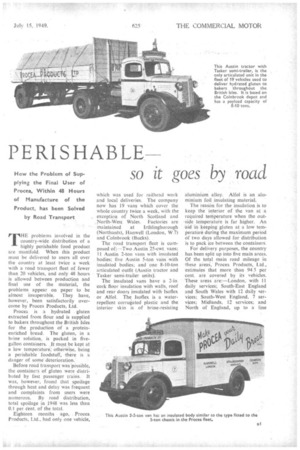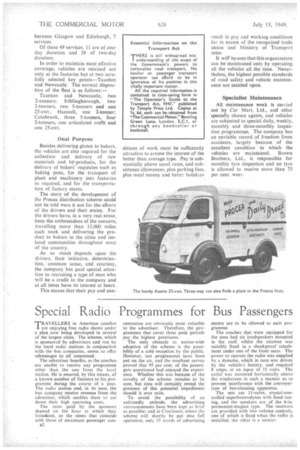PERISHABLE
Page 11

Page 12

If you've noticed an error in this article please click here to report it so we can fix it.
so it goes by road
How the Problem of Supplying the Final User of Procea, Within 48 Hours of Manufacture of the Product, has been Solved by Road Transport
THE problems involved in the country-wide distribution of a highly perishable food product are manifold. When this product must be delivered to users all over the country at least twice a week with a road transport fleet of fewer than 20 vehicles, and only 48 hours is allowed between production and final use of the material, the problems appear on paper to be almost insuperable. They have, however, been satisfactorily overcome by Procea Products, Ltd.
Procea is a hydrated gluten extracted from flour and is supplied to bakers throughout the British Isles for the production of a proteinenriched bread. The gluten, in a brine solution, is packed in fivegallon containers. It must be kept at a low temperature; otherwise, being a perishable foodstuff, there is a danger of some-deterioration..
Before road transport was -possible, the containers of gluten were .distribitted by fast passenger trains. It was, however, found that . spoilage through heat and delay was frequent and complaints from users were numerous. By road distribution, total spoilage in .1948 was less than 0.1 per eent. of the total.
Eighteen months ago, . Procea Products, Ltd., had only one vehicle, _ which was used for railhead work and local deliveries. The company now has 19 vans which cover the whole cOuntry twice a week, with the exception of North Scotland and North-West Wales. Factories are maintained at Irthlingborough (Northants), Hanwell (London, W.7) and Colnbrook (Bucks). .
The road transport fleet is composed of:---Two Austin 25-cwt. vans; 11 Austin 2-ton vans with insulated bodies; five Austin 5-ton vans -with insulated bodies; and one 8-10-ton articulated outfit (Austin tractor and Tasker semi-trailer units) The insulated vans have a 2-in. cork floor insulation with walls, roof and rear doors insulated with Isollex or Alfol. The Isoflex is a waterrepellent corrugated plastic and the interior skin is of brine-resisting aluminium alloy. Alfol is an aluminium foil insulating material.
The reason for the insulation is to keep the interior of the van at a required teMperature when the outside temperature is far higher. An aid itt keeping gluten at a low tentperatnre during the maximum period Of two days allowed for distribution is to pack ice between the containers.
For delivery purposes, the country has been split up into five main areas. Of the total main road mileage in
• these areas, Procea Products, Ltd., -estimates that more than 94 5 per cent. are covered by. its vehicles. These areas are:—London, with 11 daily services; South-East England and South Wales with 12 daily services; South-West England, 7 services; Midlands, 12 services; and North of England, up to a line
between Glasgow and Edinburgh, 7 services.
Of these 49 services, 11 are of oneday duration and 38 of two-day duration.
In order to maintain most effective coverage, vehicles are retained not only at the factories but at two carefully selected, key points—Taunton and Newcastle. The normal disposition of the fleet is as follows:— Taunton and Newcastle, two 2-tonners; _Irthlingborough, two 2-tonners, two 5-tonners and one 25-cwt.; Hanwell, one 2-tonner; Colnbrook, three 5-tonners, four 2-tonners, one articulated outfit and one 25-cwt.
Dual Purpose Besides delivering gluten to bakers, the vehicles are also required for the collection and delivery of raw materials and b5,-produets, for the delivery of bakers' requisites such as baking pans, for the transport of plant and machinery into factodes as required, and for the transportation of factory stores.
The story of the development of the Proem distribution scheme could not be told were it not for the efforts of the drivers and their mates. for the drivers have, in a very real sense, been the ambassadors of the concern, travelling more than 15,000 miles each week and delivering the product to bakers in the cities and isolated communities throughout most of the country.
As so mach depends upon the drivers, their initiative, determination, common sense, and courtesy, the company has paid special attention to recruiting a type of man who will be a credit to the company and at all times have its interest at heart.
This means that their pay and con ditions of work must be sufficiently attractive to arouse the interest of the better than average type. Pay is substantially above usual rates, and subsistence allowances, plus parking fees, plus meal money and better holidays
result in pay and working conditions far in excess of the recognized trade union and Ministry of TranspOrt rates.
It wilt be seen that this organization can be maintained only by operating all the vehicles all the time. Nevertheless, the highest possible standards of road safety and vehicle maintenance are insisted upon.
Specialist Maintenance All maintenance work is carried out by Car vfart, Ltd., and other specially chosen agents, and vehicles are subjected to special daily, weekly, monthly and three-monthly inspection programmes. The company has an enviable record of freedom from accidents, largely because of the excellent condition in which the vehicles are maintained. Brown Brothers, Ltd., is responsible for monthly tyre inspection and no tyre is allowed to receive more than 75 per cent. wear.


























